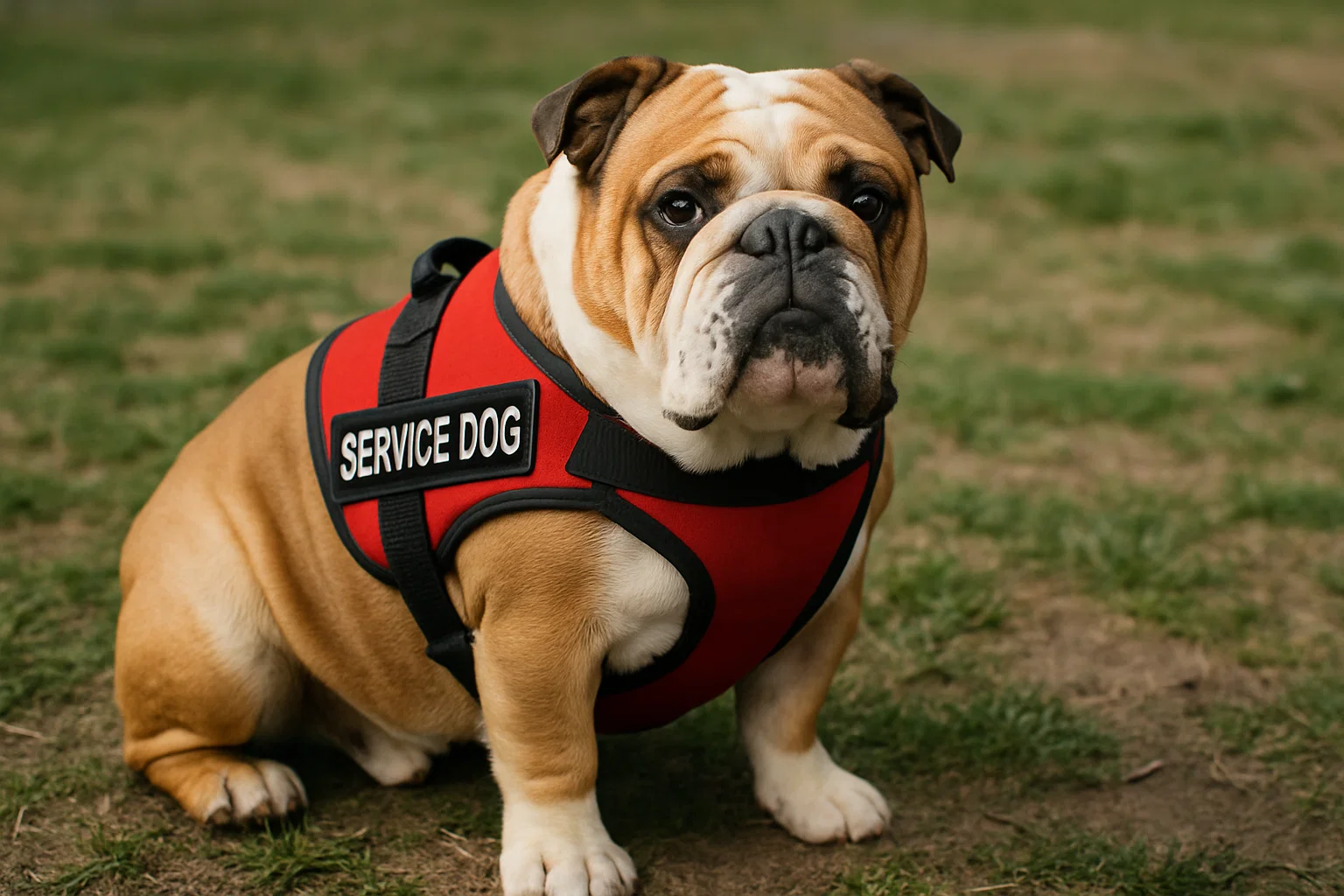Bulldog as a Service Dog
Get Your Documents

The Bulldog, recognized for its distinctive appearance and gentle demeanor, is a breed that often raises questions when considered for service dog roles. Unlike breeds traditionally favored for service work like Labradors or Golden Retrievers, Bulldogs present unique characteristics, both physical and behavioral, that impact their suitability and effectiveness in service roles. This comprehensive guide explores the Bulldog’s potential as a service dog, examining various aspects from physical attributes and temperament to their health considerations and training challenges.
Bulldog Overview
The Bulldog, also known as the English Bulldog, offers a repository of charm wrapped in a facade of distinctive facial features and a sturdy body. This breed, while primarily recognized for companionship, opens doors to the conversation of its feasibility as a service dog.
Physical Characteristics
Bulldogs are immediately identifiable thanks to their unique physical attributes:
- Size and Stature: Bulldogs are medium-sized, typically weighing between 40 to 50 pounds. Their stature is compact and muscular, with low-slung bodies that contribute to a robust and solid presence. However, their size, combined with a limited range of motion, can limit certain types of mobility-related service tasks.
- Facial Structure: Known for their wrinkled face and pushed-in nose, Bulldogs have a brachycephalic facial structure. This feature, while endearing, can lead to breathing difficulties, making strenuous activity problematic and potentially hindering their performance in high-stamina tasks.
- Coat and Maintenance: The Bulldog’s coat is short and easy to maintain, which is beneficial for handlers who might have limited physical capacity for dog grooming. Nevertheless, Bulldogs do require regular cleaning of their facial folds to prevent infections.
Temperament and Attitude
Bulldogs are renowned for their calm demeanor and affectionate nature, traits that lend themselves well to certain service roles:
- Temperament Traits: Generally docile and loyal, Bulldogs are often described as courageous yet gentle. They possess a calm disposition, making them excellent companions in quieter environments.
- Social Behavior: Bulldogs tend to get along well with other dogs and family members, exhibiting a kind and friendly attitude. Their non-aggressive personality can be advantageous in public settings.
- Stress Response: In stressful environments, Bulldogs may show signs of anxiety but generally remain composed. However, their sensitivity can sometimes result in stubbornness or a reluctance to adapt to new situations, which can affect their training as service animals.
Types of Service Work
The suitability of Bulldogs for service work varies significantly across different service roles:
- Mobility Assistance: Due to their physical limitations, Bulldogs are not typically suited for mobility assistance that requires strength, endurance, and agility.
- Medical Alert or Psychiatric Support: Bulldogs can excel in medical alert roles, such as detecting changes in blood sugar levels for diabetics. Their empathy and tendency to form strong bonds with their owners can also make them suitable for psychiatric support roles, providing comfort and emotional stability.
- Emotional Support: As emotional support animals, Bulldogs shine. Their affectionate nature and loyalty can significantly benefit individuals requiring companionship and emotional grounding, without the physical demands of traditional service dog work.
Health Considerations
Bulldogs have specific health considerations that potential handlers must evaluate when considering them for service roles:
- Respiratory Issues: Due to their brachycephalic structure, Bulldogs often suffer from respiratory challenges, including snoring, wheezing, and an increased risk of overheating. This can limit their ability to perform tasks that require physical exertion.
- Joint and Bone Health: They are prone to joint issues, including hip dysplasia and arthritis, which can further limit their movement and ability to perform mobility-based tasks.
- Skin Conditions: Regular care is needed to manage skin infections in their folds, which is an additional consideration for those who may be choosing a service dog for health-related limitations.
Training and Suitability
Training Bulldogs for service roles presents a unique set of challenges and opportunities:
- Trainability: Bulldogs are intelligent but may exhibit stubbornness, commonly perceived as a lack of trainability. This independent streak requires patient, consistent training methods that incorporate positive reinforcement.
- Intelligence and Problem Solving: They do possess problem-solving skills, which can be harnessed effectively with the right training approach. This makes them suitable for tasks that do not require rapid response but rather consistent and reliable patterns of behavior.
- Independence: Bulldogs have an independent nature that can sometimes conflict with the demands of service work, where immediate responsiveness and task-oriented focus are crucial.
Summary of Bulldog
In summarizing the Bulldog’s capabilities as a service dog, it’s essential to weigh each characteristic and health consideration alongside the specific needs and expectations of the service role.
- Key Strengths:
- Calm and affectionate nature.
- Loyalty and strong bonding potential.
- Suitability for emotional support and some medical alert roles.
- Key Weaknesses:
- Physical limitations due to respiratory and joint health issues.
- Potential stubbornness impacting trainability.
- Limited suitability for high-energy or mobility-focused tasks.
- Ideal Service Roles:
- Emotional support animal.
- Medical alert service dog, particularly in non-strenuous settings.
- Psychiatric support dog, offering companionship and emotional stability.
The Bulldog’s suitability as a service dog is particular to roles that capitalize on their strengths while compensating for their physical and behavioral challenges. By aligning their natural disposition with the relevant service requirements, Bulldogs can still offer valuable service, albeit in a more niche capacity than some other breeds.
Get Your Documents
Example State Cards













